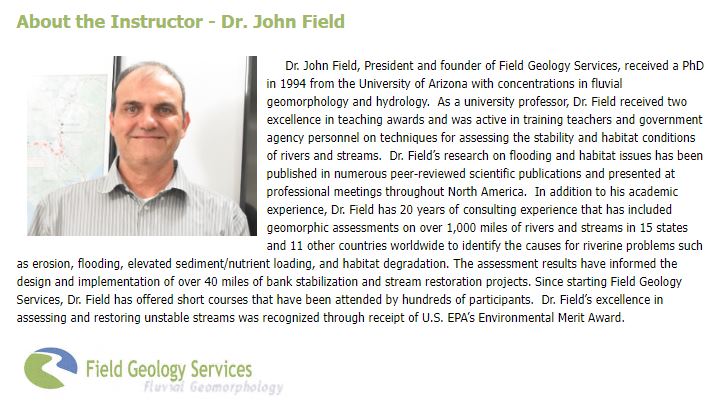
Field Geology Services is pleased to offer a three-day online short course entitled “Using Fluvial Geomorphology to Improve Stream Restoration and Watershed Management.” Given the positive response from participants in past years, the course will be offered twice during 2024 – first from April 30-May 2, 2024 and second from November 18-20, 2024. An optional virtual field trip will follow each short course on May 3 and November 21, 2024. This course covers the basic principles of fluvial geomorphology and their use in watershed assessments and the design of stream restoration projects. The virtual field trip will be to the Chesapeake Bay region with additional locations potentially added based on the interests of course registrants. The course is being organized and hosted by the River Management Society (RMS). A brief course description is found below with more details available on the RMS website along with registration information and pricing: https://rms.memberclicks.net/april-2024-fluvial-geomorphology (a link to the November course for registration is on this page but the general information other than the dates is all the same).
Feel free to call Dr. Field at 207-491-9541 or e-mail jfield@field-geology.com for further information on registration or course content. An early registration discount is available prior to March 30th (for the April-May course) and October 18th (for the November course). An additional discount is available for RMS members (and for those that join during registration). Please call or email regarding additional discounts for students and groups of three or more. We look forward to seeing you in one of the courses! Please pass this announcement to others that might be interested in the course.
Thank you,
Dr. John Field

Using Fluvial Geomorphology to Improve Stream Restoration and Watershed Management
This 3-day short course (from 10am-5pm Eastern Time each day) with an optional virtual field trip will provide an overview of fluvial geomorphology with a thorough discussion of key concepts such as the principles of equilibrium, channel classification methods, channel evolution, and sediment transport capacity. A number of examples and case studies from New England, the Pacific Northwest, the Chesapeake Bay region and elsewhere in the country will demonstrate how an understanding of fluvial geomorphology can be used in watershed assessments to identify the underlying causal mechanisms for erosion and flooding problems responsible for significant infrastructure damage and environmental degradation. Additional case studies will be used to reveal common errors made in stream restoration projects when the basic principles of fluvial geomorphology are not taken into consideration. The course will conclude with a discussion of the appropriate settings and conditions within which to employ a variety of widely used stream restoration techniques. The virtual field trip will visit degraded streams where future restoration projects may be completed and to already completed stream restoration sites in order to illustrate and reinforce the fluvial geomorphology concepts and stream restoration techniques discussed in the course.
The short course will consist of visual presentations, small group exercises, and activities that will provide participants with practical experiences and examples to recognize unstable channel reaches in a watershed and identify the most appropriate stream restoration techniques that will best address the identified instabilities, if present. The course is designed for government officials, environmental and engineering consultants, construction contractors, non-profit watershed groups, educators, students, and others dealing with flooding, erosion, nutrient loading, and habitat issues along rivers and streams.
